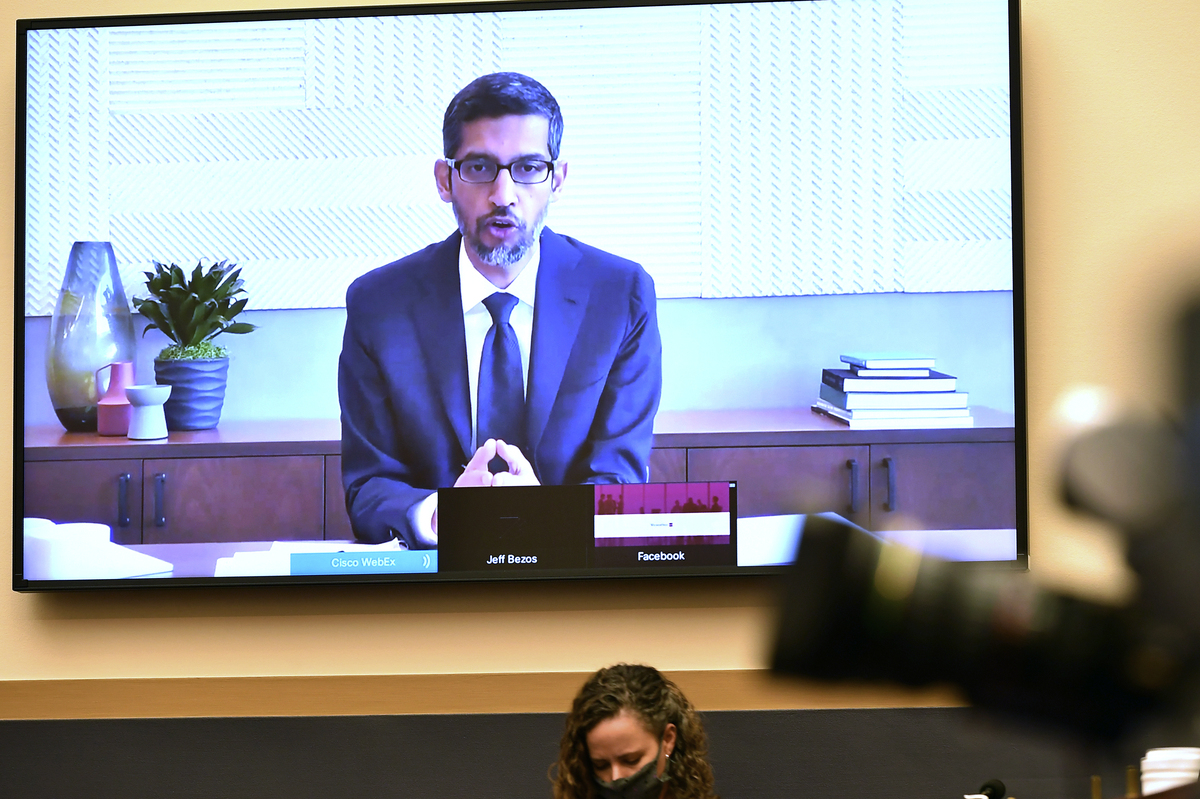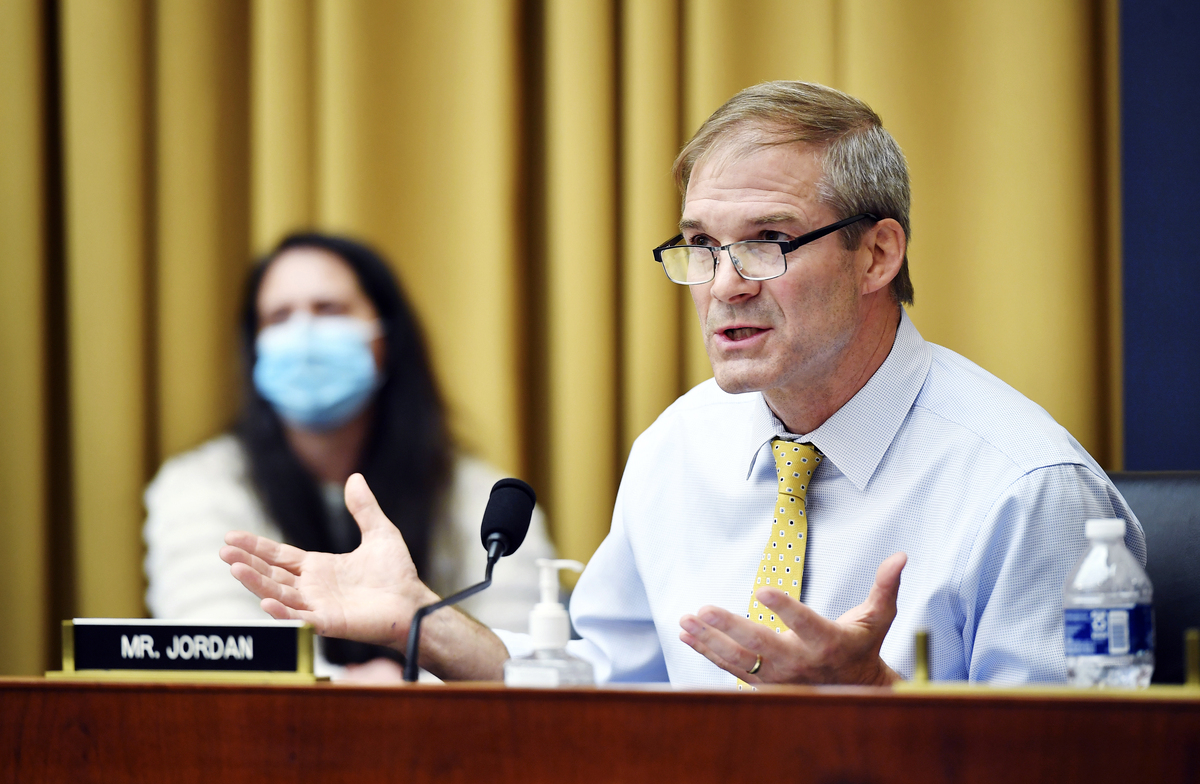
[ad_1]

Top row, Facebook CEO Mark Zuckerberg, right, Amazon CEO Jeff Bezos, second from right, and bottom row Google CEO Sundar Pichai, left, and Apple CEO Tim Cook, second from left are sworn in remotely during a House Judiciary subcommittee on antitrust on Capitol Hill.
Mandel Ngan/AP
hide caption
toggle caption
Mandel Ngan/AP

Top row, Facebook CEO Mark Zuckerberg, right, Amazon CEO Jeff Bezos, second from right, and bottom row Google CEO Sundar Pichai, left, and Apple CEO Tim Cook, second from left are sworn in remotely during a House Judiciary subcommittee on antitrust on Capitol Hill.
Mandel Ngan/AP
Four Big Tech CEOs spent Wednesday being grilled — virtually — by House lawmakers, creating a first-ever spectacle that was by turns revealing and, inevitably, awkward.
Facebook’s Mark Zuckerberg, Amazon’s Jeff Bezos, Google’s Sundar Pichai and Apple’s Tim Cook each brought their distinct mannerisms to bear, but all shared an abundantly cautious approach that extinguished most of the difficult questions with well-rehearsed lines about how their firms do not tilt the playing field in their own favor.
The House Judiciary Committee’s Democratic chairman, Rhode Island Rep. David Cicilline, concluded the day-long hearing by hinting at what might lie ahead as lawmakers ponder federal regulations to hold the four companies — worth nearly a combined $5 trillion — to account.
“These companies as they exist today have monopoly power. Some need to be broken up. All need to be properly regulated and held accountable,” said Cicilline, adding that antitrust laws written a century ago need to be updated for the digital age.
“When these laws were written, the monopolists were men named Rockefeller and Carnegie,” he said. “Today the men are named Zuckerberg, Cook, Pichai and Bezos. Once again, their control of the marketplace allows them to do whatever it takes to crush independent business and expand their own power. This must end.”
What’s next? Cicilline will issue a report expected in about a month on the subcommittee’s investigation into the companies, providing a framework for what shape new regulations on Silicon Valley could take.
Here are some key takeaways from the hearing:
Bezos ‘can’t guarantee’ Amazon never used seller data to make its own products
The heart of Wednesday’s hearing was about whether the tech companies exploit their market dominance to squash competition to juice their own products and services.
Critics of Amazon have long pointed to one alleged instance of that: when Amazon notices a third-party product is selling well on its site and uses that information to launch its own private-brand alternative, which critics say Amazon promotes over rivals.
Ever since the Wall Street Journal earlier this year revealed that Amazon was scooping up data from independent sellers and using it to create its own competing products, Amazon executives have categorically denied it.

Amazon CEO Jeff Bezos testifies remotely during a House Judiciary subcommittee on antitrust on Capitol Hill on Wednesday.
Mandel Ngan/AP
hide caption
toggle caption
Mandel Ngan/AP

Amazon CEO Jeff Bezos testifies remotely during a House Judiciary subcommittee on antitrust on Capitol Hill on Wednesday.
Mandel Ngan/AP
On Wednesday, that changed.
Rep. Pramila Jayapal, D-Wash., whose district includes Amazon’s headquarters, asked Bezos point blank: Does the company use the data it collects from other sellers on the platform for its benefit?
“I can’t answer that question yes or no,” Bezos said. “We have a policy against using seller-specific data to aid our private label business, but I can’t guarantee you that that policy has never been violated.”
It was the first time Amazon acknowledged that the $1 trillion company may be misusing data to edge out independent sellers. Bezos said Amazon is conducting an internal investigation into the matter.
Jayapal noted that Amazon has access to information about consumer habits, sellers’ pricing and inventory data — a trove of details that could be ripe for abuse if used to make business decisions about Amazon’s own products.
“You can set the rules of the game for your competitors, but not actually follow those same rules for yourself,” Jayapal said.
Hurting the competition emerges as Democrats’ primary charge against Big Tech
Amazon wasn’t the only target. The hearing promised to examine the “dominance” of all four tech giants, and a lot of the questioning — mainly from Democrats — zeroed in on competition.
Drawing on more than a million documents and hundreds of hours of testimony collected in the committee’s year-long investigation, lawmakers also peppered the other three CEOs with questions about how their companies got so big, and whether they are using their might to hurt much smaller competitors.
Google CEO Pichai was pressed on search and advertising, with lawmakers probing whether Google favors its own pages and products and accusing it of stealing content from competing services such as Yelp.

Google CEO Sundar Pichai testifies remotely during a House Judiciary subcommittee hearing on antitrust on Capitol Hill on Wednesday.
Mandel Ngan/AP
hide caption
toggle caption
Mandel Ngan/AP

Google CEO Sundar Pichai testifies remotely during a House Judiciary subcommittee hearing on antitrust on Capitol Hill on Wednesday.
Mandel Ngan/AP
“As Google became the gateway to the internet, it began to abuse its power,” Cicilline said.
The CEO responded that Google aims to give users the information they’re looking for — but he ducked some of the specific accusations.
For Facebook’s Zuckerberg, the focus was on acquisitions, particularly the company’s $1 billion deal for photo-sharing app Instagram in 2012.
Rep. Jerry Nadler, D-N.Y., quoted the CEO his own email discussing the need to “neutralize a competitor” as part of the rationale for buying Instagram.
“This is exactly the type of anticompetitive acquisition that the antitrust laws were designed to prevent,” Nadler said.
Zuckerberg was also questioned about how Facebook used another app it bought to monitor what people were doing on their smartphones, in order to identify other apps to poach.
The CEO said there are many reasons he buys companies, arguing that eight years ago, when Facebook bought Instagram, “it was far from obvious” that Instagram would grow so large, saying Facebook’s investment spurred the social media platform’s success.
Apple’s Cook, who received less attention than the other three CEOs, had to defend against charges that his company uses its App Store to punish rivals.

Apple CEO Tim Cook testifies remotely during a House Judiciary subcommittee on antitrust on Capitol Hill.
Mandel Ngan/AP
hide caption
toggle caption
Mandel Ngan/AP

Apple CEO Tim Cook testifies remotely during a House Judiciary subcommittee on antitrust on Capitol Hill.
Mandel Ngan/AP
Democratic Rep. Lucy McBath of Georgia cited Apple’s decision to remove parental control apps, such as OurPact, shortly after Apple introduced Screen Time, a competing service.
“We were concerned, congresswoman, about the privacy and security of kids,” Cook said, noting that OurPact was vulnerable to third-party takeovers. “So we were worried about their safety.”
But McBath remained skeptical.
She pointed to an email in which an Apple employee responds to a mother complaining about the removal of parental control apps. The Apple representative suggested that the mother download Apple’s Screen Time.
“Even some of the largest companies in the country fear your power. Our evidence suggests that your company has used its power to harm your rivals and boost your own business,” McBath said. “This is fundamentally unfair,” she said. “Ultimately, it reduces the competition and the choices made to consumers and that’s a great concern to all of us.”
Republicans sidetrack hearing to air complaints over anti-conservative bias
Wednesday’s hearing was supposed to be about Big Tech’s power and market dominance. But Republicans made it about something else: accusations that online platforms are biased against conservatives.
“Big Tech is out to get conservatives,” said Rep. Jim Jordan, R-Ohio, in his opening statement.
Jordan then rapidly read aloud headlines making claims that conservative-leaning publications and voices have been suppressed or censored on Facebook and Google.

Rep Jim Jordan, D-Ohio, speaks during a House Judiciary subcommittee on antitrust on Capitol Hill.
Mandel Ngan/AP
hide caption
toggle caption
Mandel Ngan/AP

Rep Jim Jordan, D-Ohio, speaks during a House Judiciary subcommittee on antitrust on Capitol Hill.
Mandel Ngan/AP
“We all think the free market is great. We think competition is great. We love the fact that these are American companies. But what’s not great is censoring people, censoring conservatives and trying to impact elections,” Jordan said. “If it doesn’t end, there has to be consequences.”
Before Jordan’s remarks, Wisconsin Republican Jim Sensenbrenner also mentioned the belief — strongly contested by large tech companies and unsupported by evidence — that conservatives do not get a fair shake from the online platforms, calling reports of conservative censorship “seriously troubling.”
“Conservatives are consumers, too, and they need the protection of antitrust laws,” Sensenbrenner said.
Missing from view? Zuckerberg’s reaction
Wednesday’s showdown was historic for bringing four of the most powerful men in technology before Congress for the first time.
In the case of Bezos, it was his Capitol Hill debut. But the hearing was also unprecedented in format. Because of the pandemic, the four CEOs, and some members, including judiciary committee chair Nadler, all called in via Cisco’s Webex video conference.
That virtual format made for surreal imagery: the four titans projected on a giant screen in the hearing room, each man contained in his own video chat box as lawmakers looked on to a hearing room of mostly empty seats.
At one point, the chair called a 10-minute recess to fix a technical issue with Bezos’s feed.
Turns out, even tech titans have IT problems.
It also drained the hearing of the kind of kinetic energy of having executives of some of the most influential companies in the world seated side by side. That would have provided a national audience with the chance to see the dynamic among the executives — who are not known to be particularly fond of one another — as well as gauge their body language and reactions to each others’ testimony.
On Twitter, observers like Wall Street Journal reporter Deepa Seetharaman lamented not being able to see Zuckerberg’s face when Bezos described social media as a “nuance destruction machine.”

Facebook CEO Mark Zuckerberg testifies remotely during a House Judiciary subcommittee hearing on antitrust on Capitol Hill on Wednesday.
Mandel Ngan/AP
hide caption
toggle caption
Mandel Ngan/AP

Facebook CEO Mark Zuckerberg testifies remotely during a House Judiciary subcommittee hearing on antitrust on Capitol Hill on Wednesday.
Mandel Ngan/AP
Notably, the most dramatic moment came not in back and forths while lawmakers were questioning the CEOs, but when Jordan, in his usual sleeves-rolled-up bulldog style, got into a full-throated screaming match with Cicilline over his denied request to allow a lawmaker not on the judiciary committee to be able to ask questions.
“We’re talking about peoples’ liberties here,” Jordan bellowed over Cicilline.
“Put your mask on,” Jordan was told.
[ad_2]
Source link
